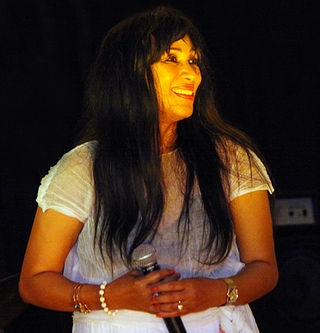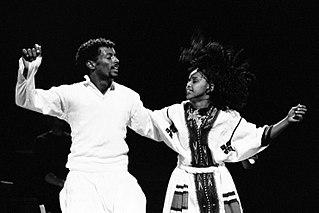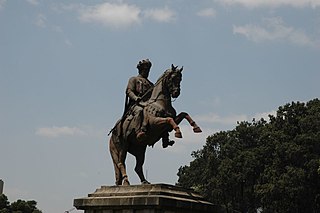Ethiopian music is a term that can mean any music of Ethiopian origin, however, often it is applied to a genre, a distinct modal system that is pentatonic, with characteristically long intervals between some notes.

Addis Ababa University (AAU) is a national university located in Addis Ababa, Ethiopia. It is the oldest university in Ethiopia. AAU has thirteen campuses. Twelve of these are situated in Addis Ababa, and one is located in Bishoftu, about 45 kilometres (28 mi) away. AAU has several associated research institutions including the Institute of Ethiopian Studies. The Ministry of Education admits qualified students to AAU based on their score on the Ethiopian University Entrance Examination (EUEE).

Aster Aweke is an Ethiopian singer-songwriter. Aster's voice has attracted broader public popularity, especially tracing back in 1990s singles and her single "Abebayehosh" in Ethiopian New Year. She is best known for her 1999 album Hagere and her 2006 album Fikir. She moved to the United States in 1981, and she returned to Ethiopia in 1997.

Tilahun Gessesse was an Ethiopian singer regarded as one of the most popular Ethiopian artist of the 20th century. Noted by his tenor voice, he was nicknamed "The Voice" during his country's "Golden Age" in the 1960s. Tilahun was an eminent singer whose works are attributed legacy to Ethiopian music. Besides his popularity, he raised money for aid during the famines of the 1970s and 1980s and earned the affection of the nation, being awarded a doctorate degree by the Addis Ababa University and also winning a lifetime achievement award from the Ethiopian Fine Art and Mass Media Prize Trust.

Blatten Geta Heruy Welde Sellase was an Ethiopian diplomat who was Foreign Minister of Ethiopia from 1930 to 1936 and a writer in Amharic. Bahru Zewde observes that his career "stands out as the great success story ... of the early twentieth-century intellectuals," then continues, "His prolific literary record, his influence with Tafari-Hayla-Sellase and his ascent in the bureaucratic hierarchy were all characterized by an unchequered progression. Edward Ullendorff concurs in this evaluation, describing his oeuvre as "a considerable and distinguished literary output."

The languages of Ethiopia include the official languages of Ethiopia, its national and regional languages, and a large number of minority languages, as well as foreign languages.

Mahmoud Ahmed is an Ethiopian singer. He gained great popularity in Ethiopia in the 1970s and among the Ethiopian diaspora in the 1980s, before rising to international fame with African music fans in Europe and the Americas.

Tewodros Kassahun Germamo, known professionally as Teddy Afro, is an Ethiopian singer-songwriter. Known by his revolutionary songs and political dissent sentiment, Teddy is considered one of the most significant Ethiopian artists of all time. Teddy has had a huge cultural impact on the Ethiopian music industry and has been a big influence on many young artists.

Alemayehu Eshete Andarge was an Ethiopian singer. He had performed since the 1960s and primarily in Amharic. He had been nicknamed "the Ethiopian Elvis".

Major Lazer is a Jamaican-American electronic dance music and DJ trio, which includes record producer Diplo, and DJs Walshy Fire and Ape Drums. They originate from Kingston, Jamaica, founded in 2008 by Diplo and Switch, with Switch leaving after three years in 2011. He was then replaced by both Jillionaire and Walshy Fire. In June 2019, Jillionaire left the group and was replaced by Ape Drums. Their music spans numerous genres, mixing reggae with dancehall, reggaeton, soca, house and moombahton.

Theodros Teshome Kebede is an Ethiopian filmmaker. Theodros is known for initiating the revival of the Ethiopian film industry in the early 2000s, and for helping to create a boom in film-making in the country. Theodros produces, directs, writes and often acts in his own films, and he has produced films that deal with social issues such as HIV, immigration, and violence against women as well as films with nationalistic content.

Hailu Mergia is an Ethiopian keyboardist, accordionist, composer, and arranger now based in Washington D.C., United States. He is known for his role in the Walias Band in the 1970s, one of the most significant groups in Ethiopia’s "golden age" of music.

Fendika is an Ethiopian music group based in Addis Ababa. Led by dancer/choreographer Melaku Belay, they operate a venue, tour, record, and perform under the name Fendika.

Endeguena Mulu, known by his stage name Ethiopian Records, is an Ethiopian music producer.

Hailu Mergia & His Classical Instrument, also known as Shemonmuanaye, is a 1985 studio album by Ethiopian jazz musician Hailu Mergia, formerly of the Walias Band. After the band split up in 1983, Mergia moved to the United States and began studying music at Howard University, during which time he discovered an accordion and began playing it. Initially intending to record a cassette of himself playing the accordion in a small studio belonging to an acquaintance at Howard, he also incorporated other instruments in the studio, such as a Rhodes piano and synthesiser.

Jano Band is an Ethiopian rock band formed by its entrepreneurs Ermyas Amelga, Bill Laswell and former manager Addis Gessesse in 2011. It versatilely mixes progressive rock with Ethiopian music. The band includes two female back and lead vocalists, two lead male vocalists, and four musicians who play bass guitar, rhythm guitar, drum, and keyboards.
Sayat Demissie is an Ethiopian singer, songwriter, actress, model and fashion designer. She debuted as a model at age 17, placing her in the top 20 in the 2004 Ethiopian Beauty Queens. She began acting in the film Sara (2006). Sayat released her debut album in 2011 and has acted in a number of movies and television series since. She returned to music with a critically acclaimed music video for her song Eskesher in 2019.

The Adwa Victory Day is a national holiday in Ethiopia which is celebrated on 2 March, in commemoration of Ethiopian victory against Italy's colonization effort at the Battle of Adwa in 1896. Paying tribute to the Ethiopian army, the celebration involves parades, dramatic and artistic performances reflecting Ethiopian culture.

Leza Awards is an Ethiopian annual film and music award held in Hilton Hotel, in Addis Ababa, Ethiopia since 2010. The award show broadcast on television channels and radio on Sheger FM 102.1.

















